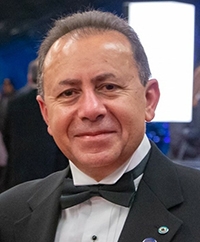
As Dr. Wahab Almuhtadi speaks during an interview by Zoom, he explains that the way he is communicating is also the technology on which he conducts research.
“Photonics is the study of light, which includes the process of light-beam generation, emission, transmission, modulation, signal processing, switching, amplification and detection/sensing of light,” Dr. Almuhtadi says. “For example, this is the way that I am looking at you now — from my work station to your work station. You can hear my voice and see my image and vice versa, and this is happening with the speed of light from end to end. The birth of the internet is a result of the fibreoptic communications and photonics.”
Dr. Almuhtadi returned to teaching in 2003, taking up his position as Professor, BIT-OSS (PLT) Co-ordinator and R&D Co-ordinator at Algonquin College’s School of Advanced Technology after working for Nortel Networks for many years. He soon established the program in photonics and laser tech at the Algonquin, and Nortel — and subsequently Ciena — equipped him with several high-performance computing digital/optical platforms.
“I designed this Optophotonics Lab to train students and corporate learners to conduct research,” says Dr. Almuhtadi, speaking in front of a series of large computing platforms. “We did some training for corporations. The program now is called Optical Systems and Sensors because some people don’t know what photonics means.”
The goals of the lab include producing graduates who can work with leading-edge technology, providing an incubation environment where high-tech small- and medium-size enterprises can test and validate their products and solutions, providing training to internet service providers and ICT companies and conducting collaborative research with industry, academia and research institutes.
When he’s not teaching, Dr. Almuhtadi researches how to improve the data transfer between continents, countries and metropolitan cities through optical system networks.
“With the internet, the world became a small village,” he says. “To connect Europe to New York, the fibreoptic cables have to go through the oceans and seas. These fibreoptic cables have to be maintained and have to have backup systems and that’s what we do. We train and increase the knowledge of faculty and students to operate, maintain, administer and provision this high-speed optical equipment. My role is passing on the knowledge.”
He notes that photonics touch almost every aspect of our daily lives, not only telecommunications and ICT but also defence, medicine, agriculture, manufacturing, consumer equipment, construction, aviation, metrology and quantum computing.
As a member of the Alliance’s Researcher Council, Dr. Almuhtadi will help the organization move forward through his unique expertise and perspective. He notes that co-operation and collaboration are critical to conducting innovative and world-leading research: “Co-operation and collaborative research is very important because this is where researchers can exchange ideas and improve the quality of the research. Co-operation is fundamental and far more productive than working in silos.”